Nottingham Trent University Pathophysiology Assignment - Referred
VerifiedAdded on 2022/10/11
|12
|3277
|20
Homework Assignment
AI Summary
This assignment delves into the pathophysiology of several diseases. The first question examines a case of a patient experiencing fatigue, breathlessness, and swelling after a heart attack, including diagnosis, pharmacotherapy, and long-term development related to blood pressure. The second question focuses on Idiopathic Pulmonary Fibrosis (IPF), describing histological changes in the lungs and comparing lung function to a healthy individual, as well as discussing the disease's development. The third question addresses atherosclerosis, its causes, and preventive measures. The final question explores Parkinson’s disease, its stages, symptoms, and the mechanisms involved in its progression. The assignment incorporates references to support the information presented.
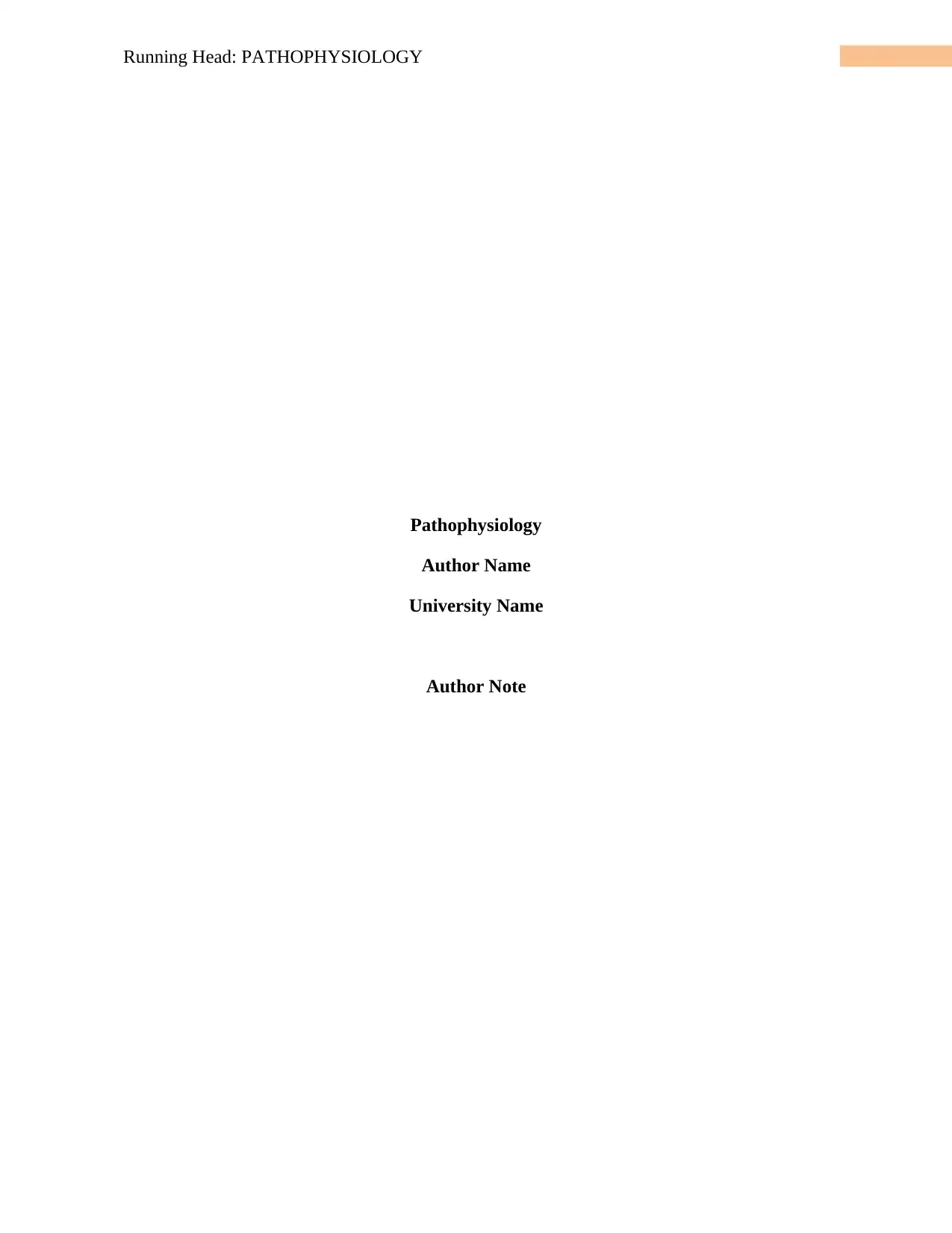
Running Head: PATHOPHYSIOLOGY
Pathophysiology
Author Name
University Name
Author Note
Pathophysiology
Author Name
University Name
Author Note
Paraphrase This Document
Need a fresh take? Get an instant paraphrase of this document with our AI Paraphraser
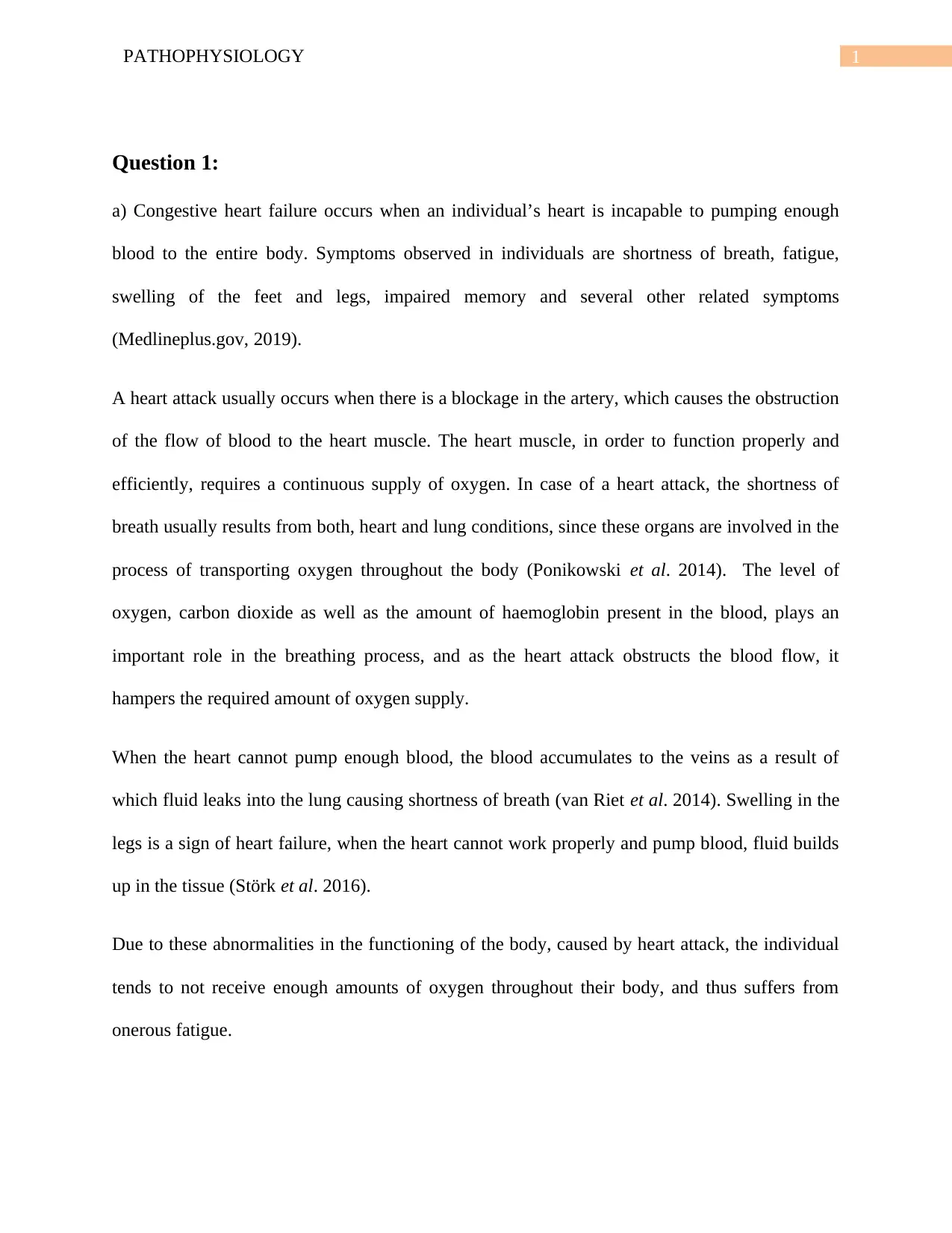
1PATHOPHYSIOLOGY
Question 1:
a) Congestive heart failure occurs when an individual’s heart is incapable to pumping enough
blood to the entire body. Symptoms observed in individuals are shortness of breath, fatigue,
swelling of the feet and legs, impaired memory and several other related symptoms
(Medlineplus.gov, 2019).
A heart attack usually occurs when there is a blockage in the artery, which causes the obstruction
of the flow of blood to the heart muscle. The heart muscle, in order to function properly and
efficiently, requires a continuous supply of oxygen. In case of a heart attack, the shortness of
breath usually results from both, heart and lung conditions, since these organs are involved in the
process of transporting oxygen throughout the body (Ponikowski et al. 2014). The level of
oxygen, carbon dioxide as well as the amount of haemoglobin present in the blood, plays an
important role in the breathing process, and as the heart attack obstructs the blood flow, it
hampers the required amount of oxygen supply.
When the heart cannot pump enough blood, the blood accumulates to the veins as a result of
which fluid leaks into the lung causing shortness of breath (van Riet et al. 2014). Swelling in the
legs is a sign of heart failure, when the heart cannot work properly and pump blood, fluid builds
up in the tissue (Störk et al. 2016).
Due to these abnormalities in the functioning of the body, caused by heart attack, the individual
tends to not receive enough amounts of oxygen throughout their body, and thus suffers from
onerous fatigue.
Question 1:
a) Congestive heart failure occurs when an individual’s heart is incapable to pumping enough
blood to the entire body. Symptoms observed in individuals are shortness of breath, fatigue,
swelling of the feet and legs, impaired memory and several other related symptoms
(Medlineplus.gov, 2019).
A heart attack usually occurs when there is a blockage in the artery, which causes the obstruction
of the flow of blood to the heart muscle. The heart muscle, in order to function properly and
efficiently, requires a continuous supply of oxygen. In case of a heart attack, the shortness of
breath usually results from both, heart and lung conditions, since these organs are involved in the
process of transporting oxygen throughout the body (Ponikowski et al. 2014). The level of
oxygen, carbon dioxide as well as the amount of haemoglobin present in the blood, plays an
important role in the breathing process, and as the heart attack obstructs the blood flow, it
hampers the required amount of oxygen supply.
When the heart cannot pump enough blood, the blood accumulates to the veins as a result of
which fluid leaks into the lung causing shortness of breath (van Riet et al. 2014). Swelling in the
legs is a sign of heart failure, when the heart cannot work properly and pump blood, fluid builds
up in the tissue (Störk et al. 2016).
Due to these abnormalities in the functioning of the body, caused by heart attack, the individual
tends to not receive enough amounts of oxygen throughout their body, and thus suffers from
onerous fatigue.
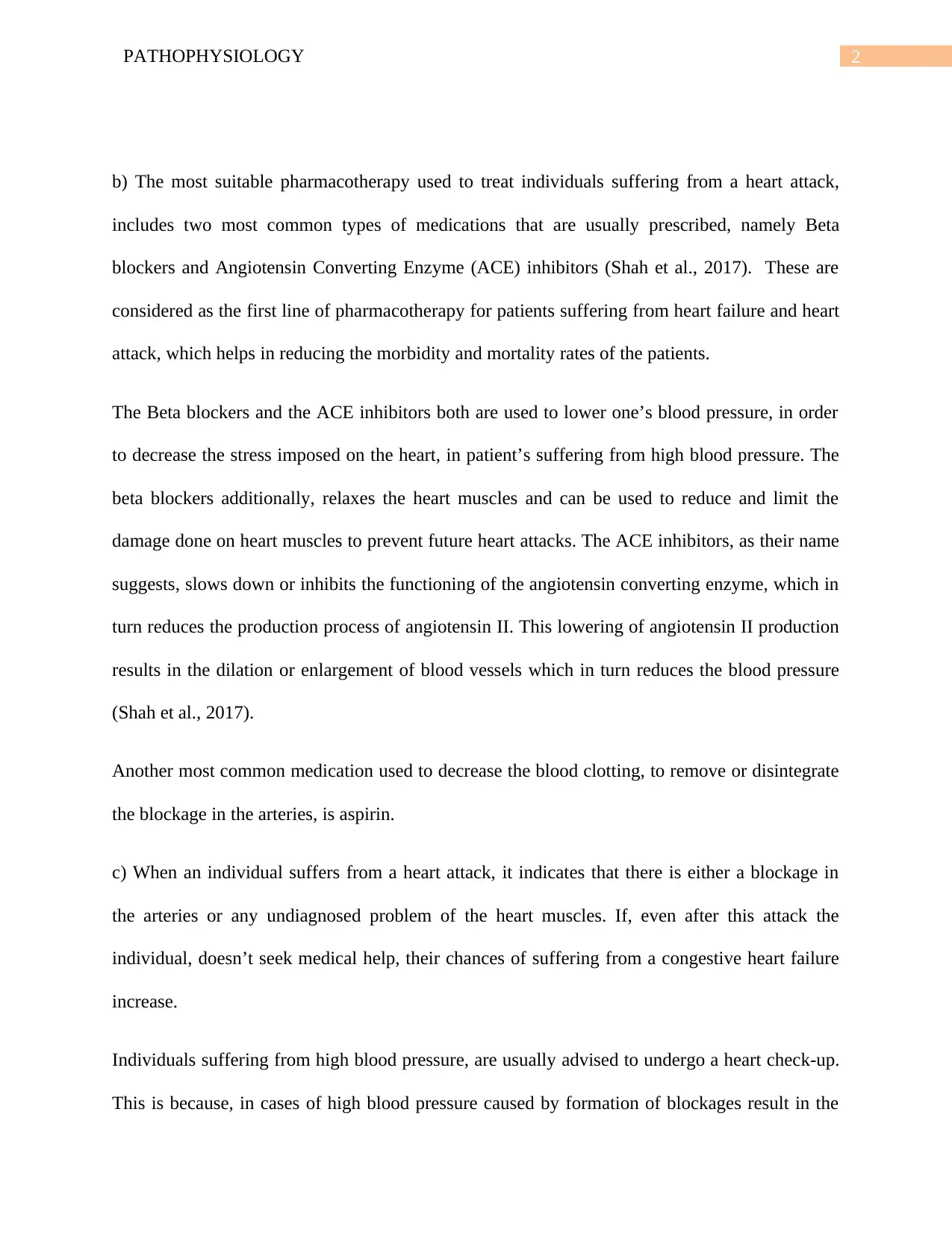
2PATHOPHYSIOLOGY
b) The most suitable pharmacotherapy used to treat individuals suffering from a heart attack,
includes two most common types of medications that are usually prescribed, namely Beta
blockers and Angiotensin Converting Enzyme (ACE) inhibitors (Shah et al., 2017). These are
considered as the first line of pharmacotherapy for patients suffering from heart failure and heart
attack, which helps in reducing the morbidity and mortality rates of the patients.
The Beta blockers and the ACE inhibitors both are used to lower one’s blood pressure, in order
to decrease the stress imposed on the heart, in patient’s suffering from high blood pressure. The
beta blockers additionally, relaxes the heart muscles and can be used to reduce and limit the
damage done on heart muscles to prevent future heart attacks. The ACE inhibitors, as their name
suggests, slows down or inhibits the functioning of the angiotensin converting enzyme, which in
turn reduces the production process of angiotensin II. This lowering of angiotensin II production
results in the dilation or enlargement of blood vessels which in turn reduces the blood pressure
(Shah et al., 2017).
Another most common medication used to decrease the blood clotting, to remove or disintegrate
the blockage in the arteries, is aspirin.
c) When an individual suffers from a heart attack, it indicates that there is either a blockage in
the arteries or any undiagnosed problem of the heart muscles. If, even after this attack the
individual, doesn’t seek medical help, their chances of suffering from a congestive heart failure
increase.
Individuals suffering from high blood pressure, are usually advised to undergo a heart check-up.
This is because, in cases of high blood pressure caused by formation of blockages result in the
b) The most suitable pharmacotherapy used to treat individuals suffering from a heart attack,
includes two most common types of medications that are usually prescribed, namely Beta
blockers and Angiotensin Converting Enzyme (ACE) inhibitors (Shah et al., 2017). These are
considered as the first line of pharmacotherapy for patients suffering from heart failure and heart
attack, which helps in reducing the morbidity and mortality rates of the patients.
The Beta blockers and the ACE inhibitors both are used to lower one’s blood pressure, in order
to decrease the stress imposed on the heart, in patient’s suffering from high blood pressure. The
beta blockers additionally, relaxes the heart muscles and can be used to reduce and limit the
damage done on heart muscles to prevent future heart attacks. The ACE inhibitors, as their name
suggests, slows down or inhibits the functioning of the angiotensin converting enzyme, which in
turn reduces the production process of angiotensin II. This lowering of angiotensin II production
results in the dilation or enlargement of blood vessels which in turn reduces the blood pressure
(Shah et al., 2017).
Another most common medication used to decrease the blood clotting, to remove or disintegrate
the blockage in the arteries, is aspirin.
c) When an individual suffers from a heart attack, it indicates that there is either a blockage in
the arteries or any undiagnosed problem of the heart muscles. If, even after this attack the
individual, doesn’t seek medical help, their chances of suffering from a congestive heart failure
increase.
Individuals suffering from high blood pressure, are usually advised to undergo a heart check-up.
This is because, in cases of high blood pressure caused by formation of blockages result in the
⊘ This is a preview!⊘
Do you want full access?
Subscribe today to unlock all pages.

Trusted by 1+ million students worldwide
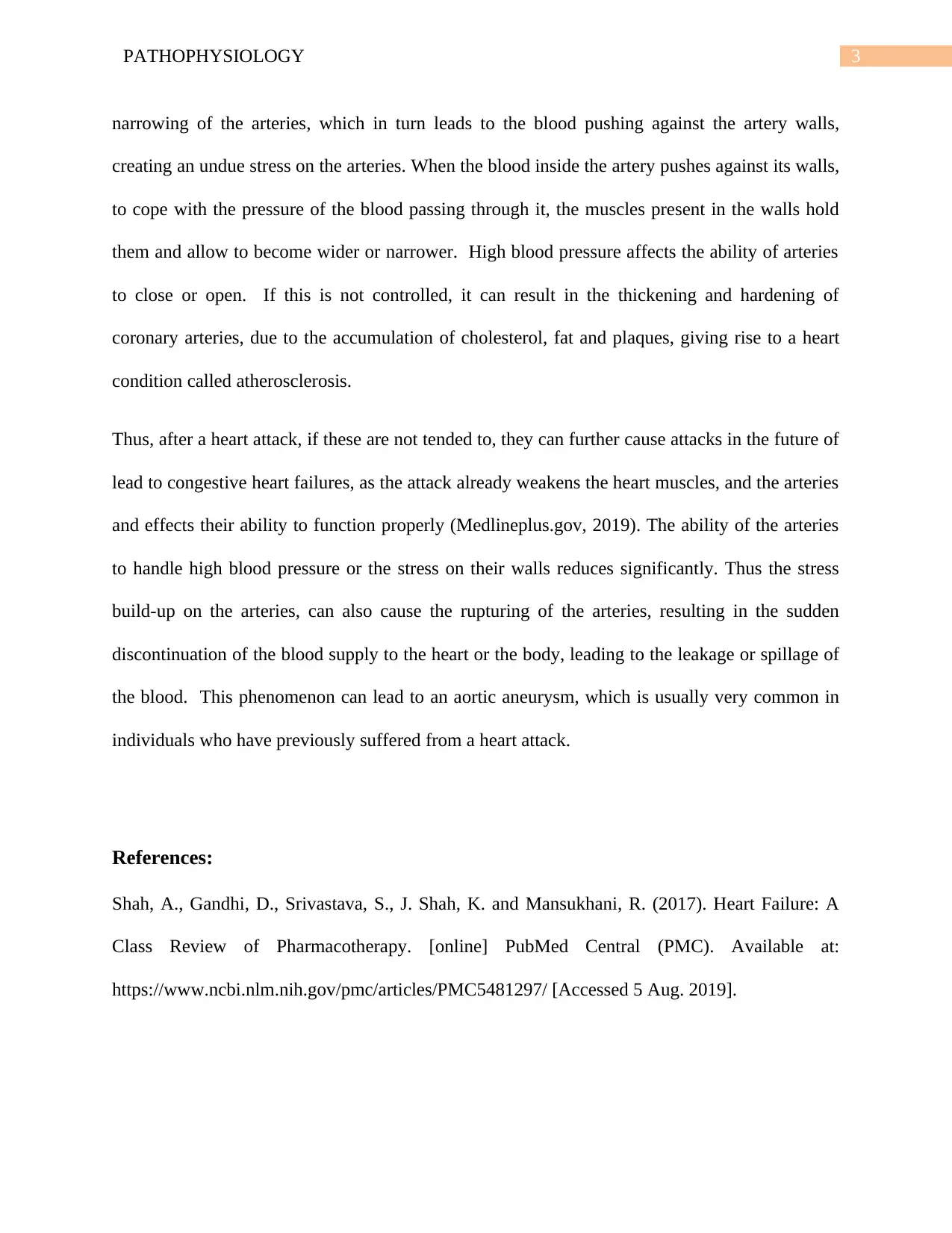
3PATHOPHYSIOLOGY
narrowing of the arteries, which in turn leads to the blood pushing against the artery walls,
creating an undue stress on the arteries. When the blood inside the artery pushes against its walls,
to cope with the pressure of the blood passing through it, the muscles present in the walls hold
them and allow to become wider or narrower. High blood pressure affects the ability of arteries
to close or open. If this is not controlled, it can result in the thickening and hardening of
coronary arteries, due to the accumulation of cholesterol, fat and plaques, giving rise to a heart
condition called atherosclerosis.
Thus, after a heart attack, if these are not tended to, they can further cause attacks in the future of
lead to congestive heart failures, as the attack already weakens the heart muscles, and the arteries
and effects their ability to function properly (Medlineplus.gov, 2019). The ability of the arteries
to handle high blood pressure or the stress on their walls reduces significantly. Thus the stress
build-up on the arteries, can also cause the rupturing of the arteries, resulting in the sudden
discontinuation of the blood supply to the heart or the body, leading to the leakage or spillage of
the blood. This phenomenon can lead to an aortic aneurysm, which is usually very common in
individuals who have previously suffered from a heart attack.
References:
Shah, A., Gandhi, D., Srivastava, S., J. Shah, K. and Mansukhani, R. (2017). Heart Failure: A
Class Review of Pharmacotherapy. [online] PubMed Central (PMC). Available at:
https://www.ncbi.nlm.nih.gov/pmc/articles/PMC5481297/ [Accessed 5 Aug. 2019].
narrowing of the arteries, which in turn leads to the blood pushing against the artery walls,
creating an undue stress on the arteries. When the blood inside the artery pushes against its walls,
to cope with the pressure of the blood passing through it, the muscles present in the walls hold
them and allow to become wider or narrower. High blood pressure affects the ability of arteries
to close or open. If this is not controlled, it can result in the thickening and hardening of
coronary arteries, due to the accumulation of cholesterol, fat and plaques, giving rise to a heart
condition called atherosclerosis.
Thus, after a heart attack, if these are not tended to, they can further cause attacks in the future of
lead to congestive heart failures, as the attack already weakens the heart muscles, and the arteries
and effects their ability to function properly (Medlineplus.gov, 2019). The ability of the arteries
to handle high blood pressure or the stress on their walls reduces significantly. Thus the stress
build-up on the arteries, can also cause the rupturing of the arteries, resulting in the sudden
discontinuation of the blood supply to the heart or the body, leading to the leakage or spillage of
the blood. This phenomenon can lead to an aortic aneurysm, which is usually very common in
individuals who have previously suffered from a heart attack.
References:
Shah, A., Gandhi, D., Srivastava, S., J. Shah, K. and Mansukhani, R. (2017). Heart Failure: A
Class Review of Pharmacotherapy. [online] PubMed Central (PMC). Available at:
https://www.ncbi.nlm.nih.gov/pmc/articles/PMC5481297/ [Accessed 5 Aug. 2019].
Paraphrase This Document
Need a fresh take? Get an instant paraphrase of this document with our AI Paraphraser
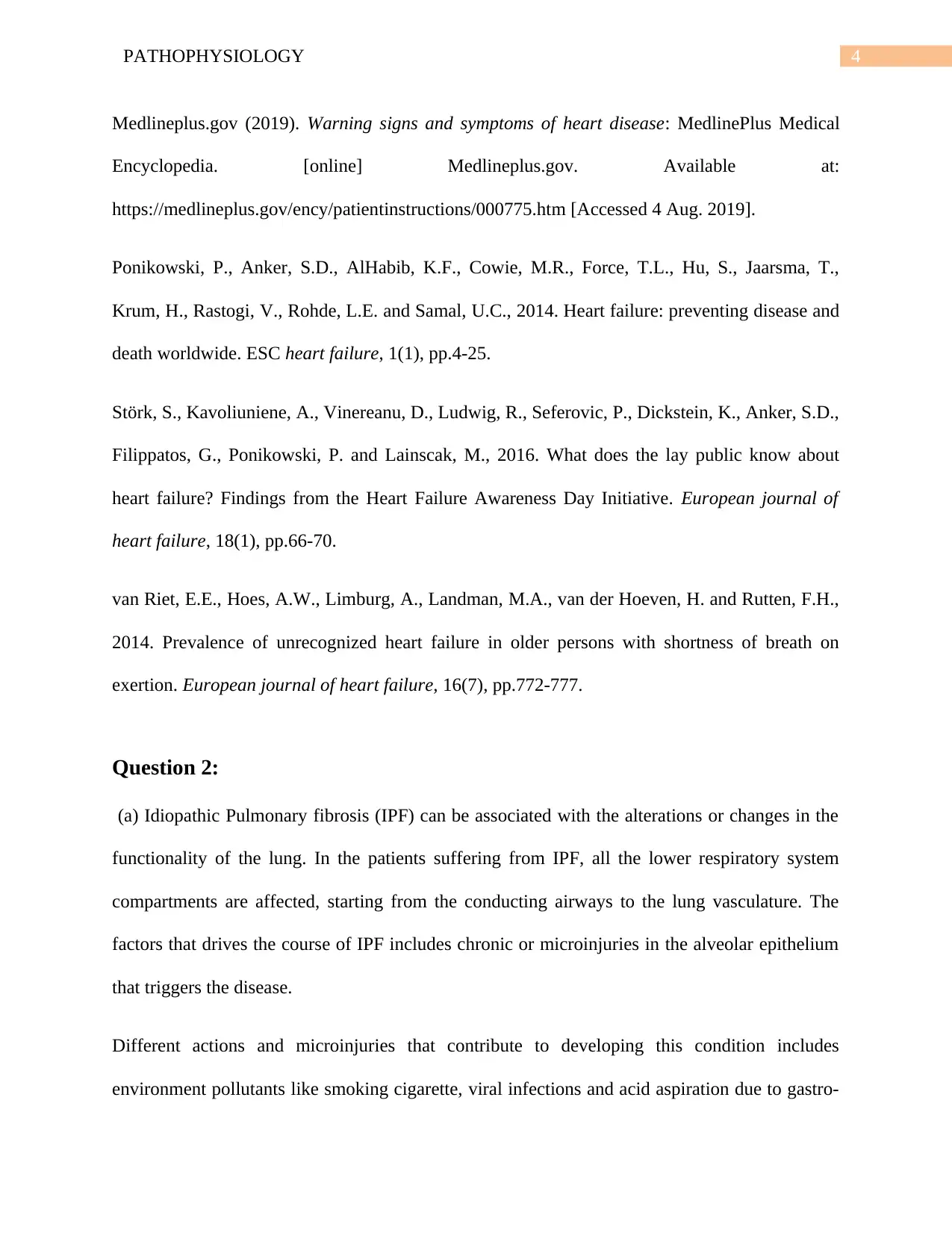
4PATHOPHYSIOLOGY
Medlineplus.gov (2019). Warning signs and symptoms of heart disease: MedlinePlus Medical
Encyclopedia. [online] Medlineplus.gov. Available at:
https://medlineplus.gov/ency/patientinstructions/000775.htm [Accessed 4 Aug. 2019].
Ponikowski, P., Anker, S.D., AlHabib, K.F., Cowie, M.R., Force, T.L., Hu, S., Jaarsma, T.,
Krum, H., Rastogi, V., Rohde, L.E. and Samal, U.C., 2014. Heart failure: preventing disease and
death worldwide. ESC heart failure, 1(1), pp.4-25.
Störk, S., Kavoliuniene, A., Vinereanu, D., Ludwig, R., Seferovic, P., Dickstein, K., Anker, S.D.,
Filippatos, G., Ponikowski, P. and Lainscak, M., 2016. What does the lay public know about
heart failure? Findings from the Heart Failure Awareness Day Initiative. European journal of
heart failure, 18(1), pp.66-70.
van Riet, E.E., Hoes, A.W., Limburg, A., Landman, M.A., van der Hoeven, H. and Rutten, F.H.,
2014. Prevalence of unrecognized heart failure in older persons with shortness of breath on
exertion. European journal of heart failure, 16(7), pp.772-777.
Question 2:
(a) Idiopathic Pulmonary fibrosis (IPF) can be associated with the alterations or changes in the
functionality of the lung. In the patients suffering from IPF, all the lower respiratory system
compartments are affected, starting from the conducting airways to the lung vasculature. The
factors that drives the course of IPF includes chronic or microinjuries in the alveolar epithelium
that triggers the disease.
Different actions and microinjuries that contribute to developing this condition includes
environment pollutants like smoking cigarette, viral infections and acid aspiration due to gastro-
Medlineplus.gov (2019). Warning signs and symptoms of heart disease: MedlinePlus Medical
Encyclopedia. [online] Medlineplus.gov. Available at:
https://medlineplus.gov/ency/patientinstructions/000775.htm [Accessed 4 Aug. 2019].
Ponikowski, P., Anker, S.D., AlHabib, K.F., Cowie, M.R., Force, T.L., Hu, S., Jaarsma, T.,
Krum, H., Rastogi, V., Rohde, L.E. and Samal, U.C., 2014. Heart failure: preventing disease and
death worldwide. ESC heart failure, 1(1), pp.4-25.
Störk, S., Kavoliuniene, A., Vinereanu, D., Ludwig, R., Seferovic, P., Dickstein, K., Anker, S.D.,
Filippatos, G., Ponikowski, P. and Lainscak, M., 2016. What does the lay public know about
heart failure? Findings from the Heart Failure Awareness Day Initiative. European journal of
heart failure, 18(1), pp.66-70.
van Riet, E.E., Hoes, A.W., Limburg, A., Landman, M.A., van der Hoeven, H. and Rutten, F.H.,
2014. Prevalence of unrecognized heart failure in older persons with shortness of breath on
exertion. European journal of heart failure, 16(7), pp.772-777.
Question 2:
(a) Idiopathic Pulmonary fibrosis (IPF) can be associated with the alterations or changes in the
functionality of the lung. In the patients suffering from IPF, all the lower respiratory system
compartments are affected, starting from the conducting airways to the lung vasculature. The
factors that drives the course of IPF includes chronic or microinjuries in the alveolar epithelium
that triggers the disease.
Different actions and microinjuries that contribute to developing this condition includes
environment pollutants like smoking cigarette, viral infections and acid aspiration due to gastro-
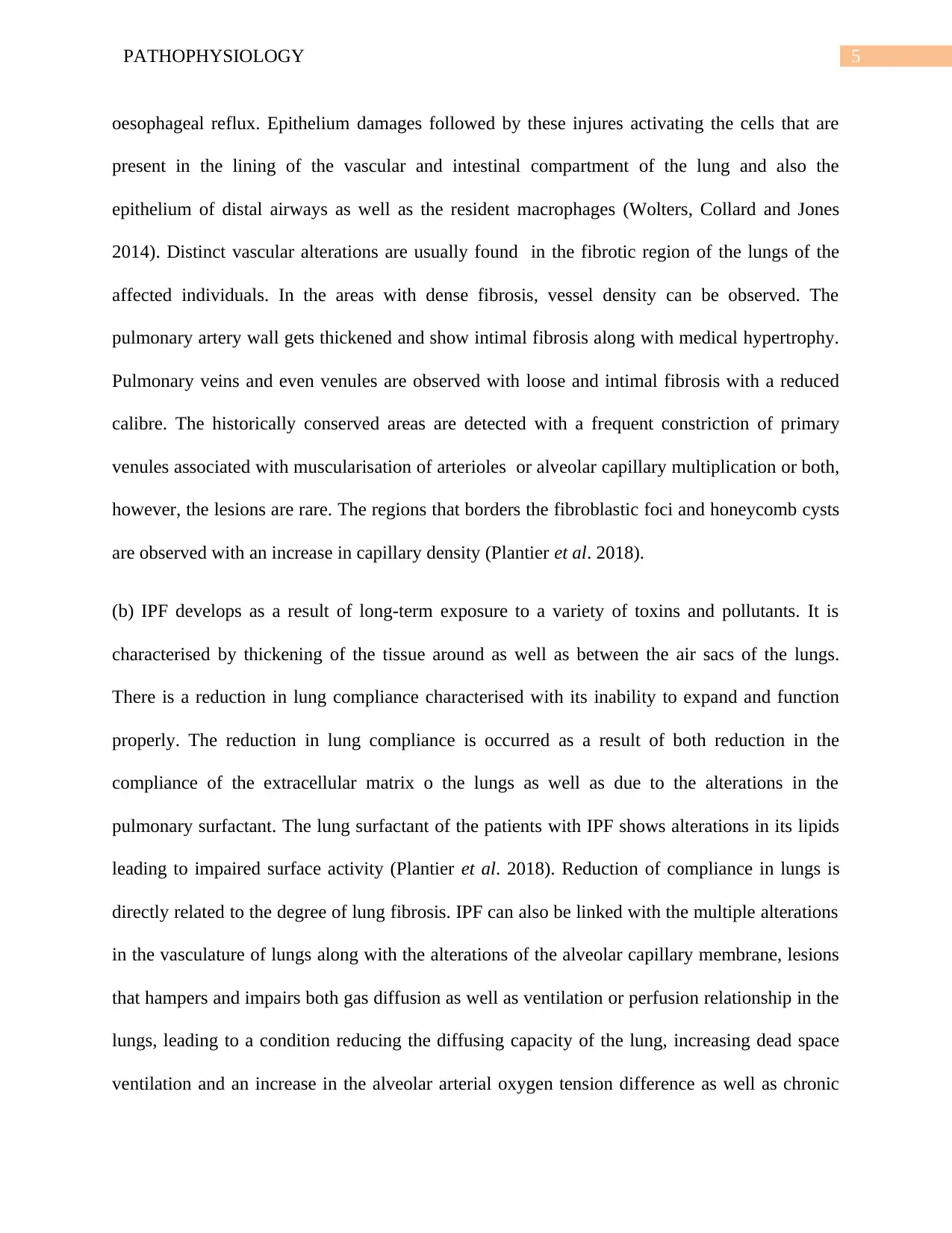
5PATHOPHYSIOLOGY
oesophageal reflux. Epithelium damages followed by these injures activating the cells that are
present in the lining of the vascular and intestinal compartment of the lung and also the
epithelium of distal airways as well as the resident macrophages (Wolters, Collard and Jones
2014). Distinct vascular alterations are usually found in the fibrotic region of the lungs of the
affected individuals. In the areas with dense fibrosis, vessel density can be observed. The
pulmonary artery wall gets thickened and show intimal fibrosis along with medical hypertrophy.
Pulmonary veins and even venules are observed with loose and intimal fibrosis with a reduced
calibre. The historically conserved areas are detected with a frequent constriction of primary
venules associated with muscularisation of arterioles or alveolar capillary multiplication or both,
however, the lesions are rare. The regions that borders the fibroblastic foci and honeycomb cysts
are observed with an increase in capillary density (Plantier et al. 2018).
(b) IPF develops as a result of long-term exposure to a variety of toxins and pollutants. It is
characterised by thickening of the tissue around as well as between the air sacs of the lungs.
There is a reduction in lung compliance characterised with its inability to expand and function
properly. The reduction in lung compliance is occurred as a result of both reduction in the
compliance of the extracellular matrix o the lungs as well as due to the alterations in the
pulmonary surfactant. The lung surfactant of the patients with IPF shows alterations in its lipids
leading to impaired surface activity (Plantier et al. 2018). Reduction of compliance in lungs is
directly related to the degree of lung fibrosis. IPF can also be linked with the multiple alterations
in the vasculature of lungs along with the alterations of the alveolar capillary membrane, lesions
that hampers and impairs both gas diffusion as well as ventilation or perfusion relationship in the
lungs, leading to a condition reducing the diffusing capacity of the lung, increasing dead space
ventilation and an increase in the alveolar arterial oxygen tension difference as well as chronic
oesophageal reflux. Epithelium damages followed by these injures activating the cells that are
present in the lining of the vascular and intestinal compartment of the lung and also the
epithelium of distal airways as well as the resident macrophages (Wolters, Collard and Jones
2014). Distinct vascular alterations are usually found in the fibrotic region of the lungs of the
affected individuals. In the areas with dense fibrosis, vessel density can be observed. The
pulmonary artery wall gets thickened and show intimal fibrosis along with medical hypertrophy.
Pulmonary veins and even venules are observed with loose and intimal fibrosis with a reduced
calibre. The historically conserved areas are detected with a frequent constriction of primary
venules associated with muscularisation of arterioles or alveolar capillary multiplication or both,
however, the lesions are rare. The regions that borders the fibroblastic foci and honeycomb cysts
are observed with an increase in capillary density (Plantier et al. 2018).
(b) IPF develops as a result of long-term exposure to a variety of toxins and pollutants. It is
characterised by thickening of the tissue around as well as between the air sacs of the lungs.
There is a reduction in lung compliance characterised with its inability to expand and function
properly. The reduction in lung compliance is occurred as a result of both reduction in the
compliance of the extracellular matrix o the lungs as well as due to the alterations in the
pulmonary surfactant. The lung surfactant of the patients with IPF shows alterations in its lipids
leading to impaired surface activity (Plantier et al. 2018). Reduction of compliance in lungs is
directly related to the degree of lung fibrosis. IPF can also be linked with the multiple alterations
in the vasculature of lungs along with the alterations of the alveolar capillary membrane, lesions
that hampers and impairs both gas diffusion as well as ventilation or perfusion relationship in the
lungs, leading to a condition reducing the diffusing capacity of the lung, increasing dead space
ventilation and an increase in the alveolar arterial oxygen tension difference as well as chronic
⊘ This is a preview!⊘
Do you want full access?
Subscribe today to unlock all pages.

Trusted by 1+ million students worldwide
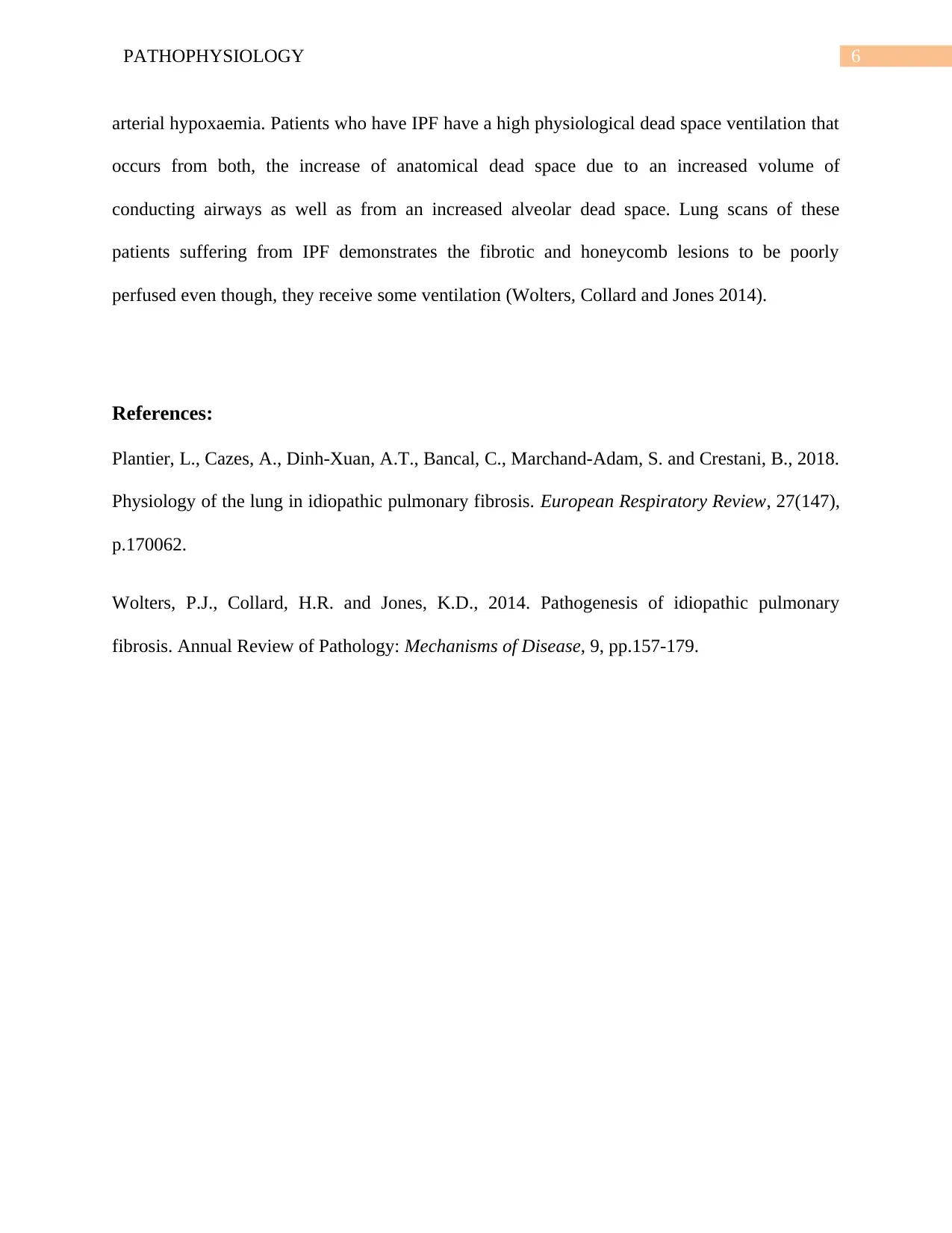
6PATHOPHYSIOLOGY
arterial hypoxaemia. Patients who have IPF have a high physiological dead space ventilation that
occurs from both, the increase of anatomical dead space due to an increased volume of
conducting airways as well as from an increased alveolar dead space. Lung scans of these
patients suffering from IPF demonstrates the fibrotic and honeycomb lesions to be poorly
perfused even though, they receive some ventilation (Wolters, Collard and Jones 2014).
References:
Plantier, L., Cazes, A., Dinh-Xuan, A.T., Bancal, C., Marchand-Adam, S. and Crestani, B., 2018.
Physiology of the lung in idiopathic pulmonary fibrosis. European Respiratory Review, 27(147),
p.170062.
Wolters, P.J., Collard, H.R. and Jones, K.D., 2014. Pathogenesis of idiopathic pulmonary
fibrosis. Annual Review of Pathology: Mechanisms of Disease, 9, pp.157-179.
arterial hypoxaemia. Patients who have IPF have a high physiological dead space ventilation that
occurs from both, the increase of anatomical dead space due to an increased volume of
conducting airways as well as from an increased alveolar dead space. Lung scans of these
patients suffering from IPF demonstrates the fibrotic and honeycomb lesions to be poorly
perfused even though, they receive some ventilation (Wolters, Collard and Jones 2014).
References:
Plantier, L., Cazes, A., Dinh-Xuan, A.T., Bancal, C., Marchand-Adam, S. and Crestani, B., 2018.
Physiology of the lung in idiopathic pulmonary fibrosis. European Respiratory Review, 27(147),
p.170062.
Wolters, P.J., Collard, H.R. and Jones, K.D., 2014. Pathogenesis of idiopathic pulmonary
fibrosis. Annual Review of Pathology: Mechanisms of Disease, 9, pp.157-179.
Paraphrase This Document
Need a fresh take? Get an instant paraphrase of this document with our AI Paraphraser
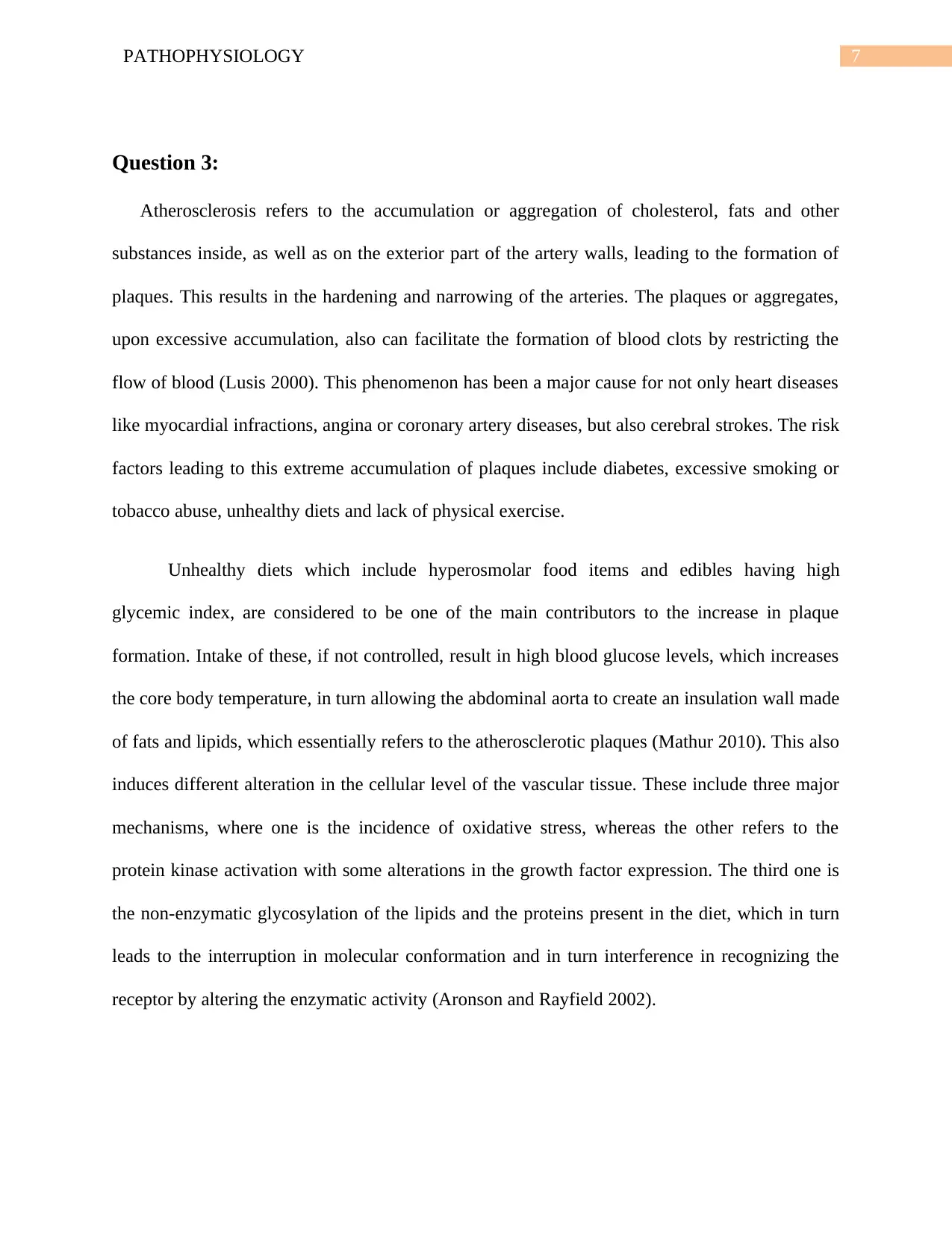
7PATHOPHYSIOLOGY
Question 3:
Atherosclerosis refers to the accumulation or aggregation of cholesterol, fats and other
substances inside, as well as on the exterior part of the artery walls, leading to the formation of
plaques. This results in the hardening and narrowing of the arteries. The plaques or aggregates,
upon excessive accumulation, also can facilitate the formation of blood clots by restricting the
flow of blood (Lusis 2000). This phenomenon has been a major cause for not only heart diseases
like myocardial infractions, angina or coronary artery diseases, but also cerebral strokes. The risk
factors leading to this extreme accumulation of plaques include diabetes, excessive smoking or
tobacco abuse, unhealthy diets and lack of physical exercise.
Unhealthy diets which include hyperosmolar food items and edibles having high
glycemic index, are considered to be one of the main contributors to the increase in plaque
formation. Intake of these, if not controlled, result in high blood glucose levels, which increases
the core body temperature, in turn allowing the abdominal aorta to create an insulation wall made
of fats and lipids, which essentially refers to the atherosclerotic plaques (Mathur 2010). This also
induces different alteration in the cellular level of the vascular tissue. These include three major
mechanisms, where one is the incidence of oxidative stress, whereas the other refers to the
protein kinase activation with some alterations in the growth factor expression. The third one is
the non-enzymatic glycosylation of the lipids and the proteins present in the diet, which in turn
leads to the interruption in molecular conformation and in turn interference in recognizing the
receptor by altering the enzymatic activity (Aronson and Rayfield 2002).
Question 3:
Atherosclerosis refers to the accumulation or aggregation of cholesterol, fats and other
substances inside, as well as on the exterior part of the artery walls, leading to the formation of
plaques. This results in the hardening and narrowing of the arteries. The plaques or aggregates,
upon excessive accumulation, also can facilitate the formation of blood clots by restricting the
flow of blood (Lusis 2000). This phenomenon has been a major cause for not only heart diseases
like myocardial infractions, angina or coronary artery diseases, but also cerebral strokes. The risk
factors leading to this extreme accumulation of plaques include diabetes, excessive smoking or
tobacco abuse, unhealthy diets and lack of physical exercise.
Unhealthy diets which include hyperosmolar food items and edibles having high
glycemic index, are considered to be one of the main contributors to the increase in plaque
formation. Intake of these, if not controlled, result in high blood glucose levels, which increases
the core body temperature, in turn allowing the abdominal aorta to create an insulation wall made
of fats and lipids, which essentially refers to the atherosclerotic plaques (Mathur 2010). This also
induces different alteration in the cellular level of the vascular tissue. These include three major
mechanisms, where one is the incidence of oxidative stress, whereas the other refers to the
protein kinase activation with some alterations in the growth factor expression. The third one is
the non-enzymatic glycosylation of the lipids and the proteins present in the diet, which in turn
leads to the interruption in molecular conformation and in turn interference in recognizing the
receptor by altering the enzymatic activity (Aronson and Rayfield 2002).
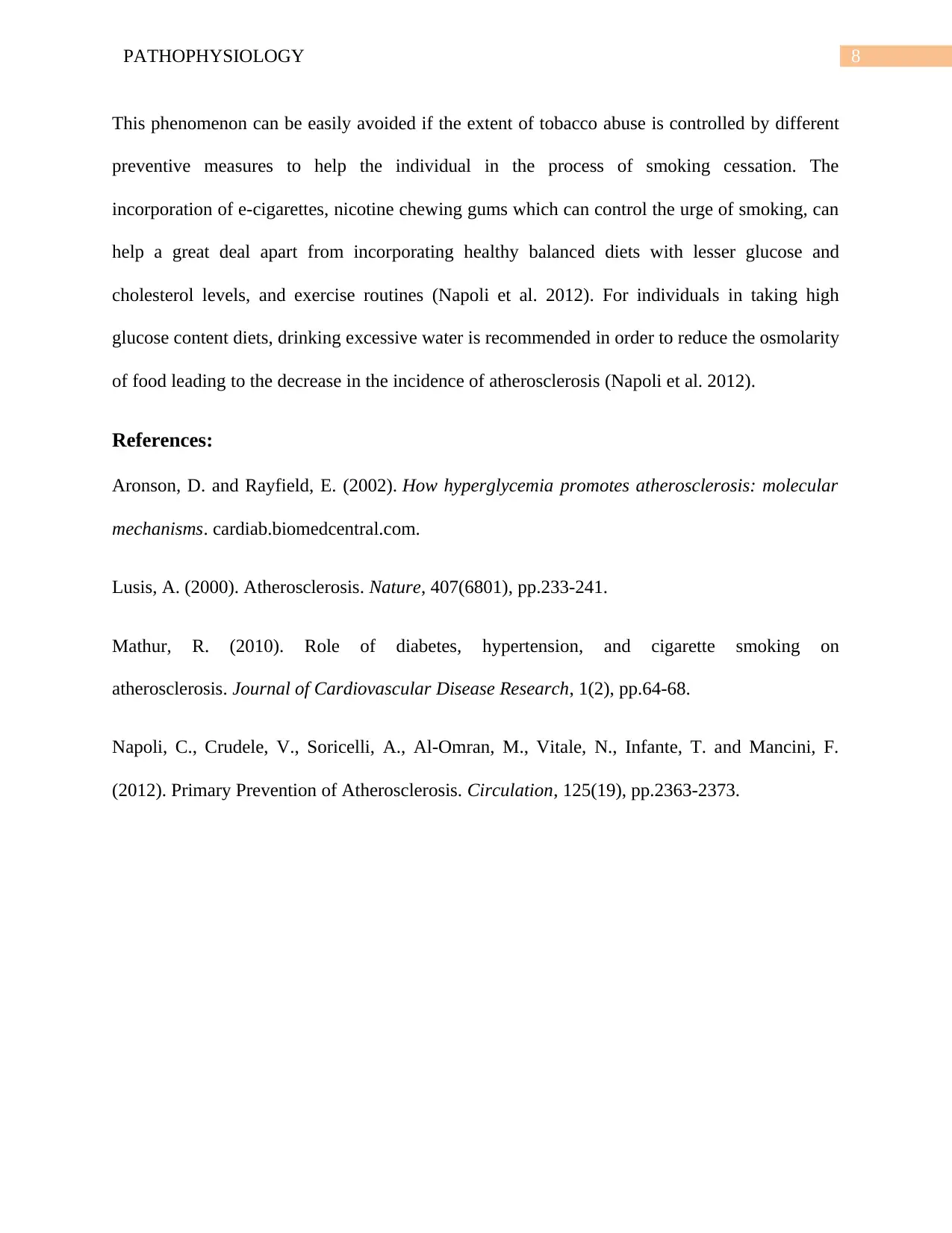
8PATHOPHYSIOLOGY
This phenomenon can be easily avoided if the extent of tobacco abuse is controlled by different
preventive measures to help the individual in the process of smoking cessation. The
incorporation of e-cigarettes, nicotine chewing gums which can control the urge of smoking, can
help a great deal apart from incorporating healthy balanced diets with lesser glucose and
cholesterol levels, and exercise routines (Napoli et al. 2012). For individuals in taking high
glucose content diets, drinking excessive water is recommended in order to reduce the osmolarity
of food leading to the decrease in the incidence of atherosclerosis (Napoli et al. 2012).
References:
Aronson, D. and Rayfield, E. (2002). How hyperglycemia promotes atherosclerosis: molecular
mechanisms. cardiab.biomedcentral.com.
Lusis, A. (2000). Atherosclerosis. Nature, 407(6801), pp.233-241.
Mathur, R. (2010). Role of diabetes, hypertension, and cigarette smoking on
atherosclerosis. Journal of Cardiovascular Disease Research, 1(2), pp.64-68.
Napoli, C., Crudele, V., Soricelli, A., Al-Omran, M., Vitale, N., Infante, T. and Mancini, F.
(2012). Primary Prevention of Atherosclerosis. Circulation, 125(19), pp.2363-2373.
This phenomenon can be easily avoided if the extent of tobacco abuse is controlled by different
preventive measures to help the individual in the process of smoking cessation. The
incorporation of e-cigarettes, nicotine chewing gums which can control the urge of smoking, can
help a great deal apart from incorporating healthy balanced diets with lesser glucose and
cholesterol levels, and exercise routines (Napoli et al. 2012). For individuals in taking high
glucose content diets, drinking excessive water is recommended in order to reduce the osmolarity
of food leading to the decrease in the incidence of atherosclerosis (Napoli et al. 2012).
References:
Aronson, D. and Rayfield, E. (2002). How hyperglycemia promotes atherosclerosis: molecular
mechanisms. cardiab.biomedcentral.com.
Lusis, A. (2000). Atherosclerosis. Nature, 407(6801), pp.233-241.
Mathur, R. (2010). Role of diabetes, hypertension, and cigarette smoking on
atherosclerosis. Journal of Cardiovascular Disease Research, 1(2), pp.64-68.
Napoli, C., Crudele, V., Soricelli, A., Al-Omran, M., Vitale, N., Infante, T. and Mancini, F.
(2012). Primary Prevention of Atherosclerosis. Circulation, 125(19), pp.2363-2373.
⊘ This is a preview!⊘
Do you want full access?
Subscribe today to unlock all pages.

Trusted by 1+ million students worldwide
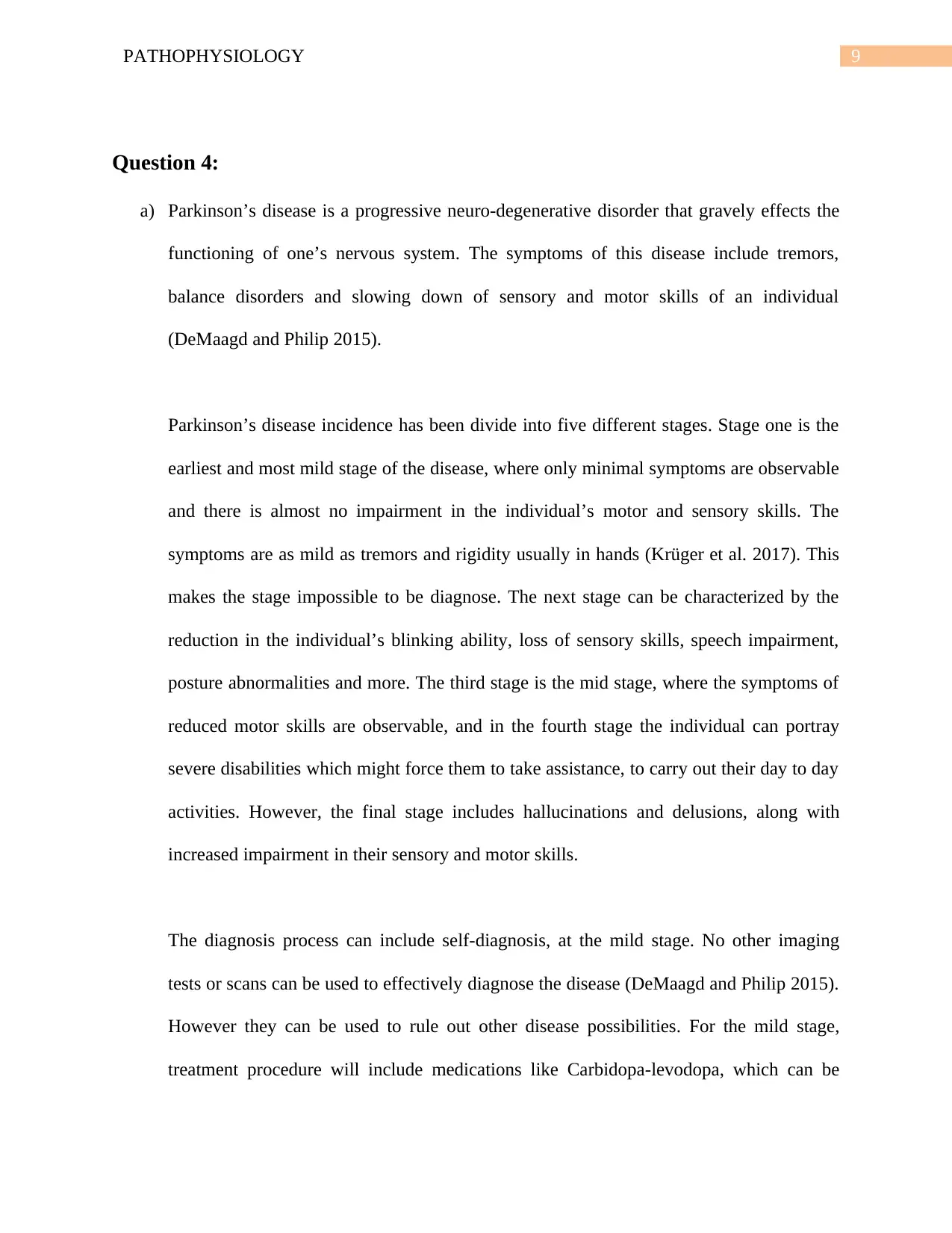
9PATHOPHYSIOLOGY
Question 4:
a) Parkinson’s disease is a progressive neuro-degenerative disorder that gravely effects the
functioning of one’s nervous system. The symptoms of this disease include tremors,
balance disorders and slowing down of sensory and motor skills of an individual
(DeMaagd and Philip 2015).
Parkinson’s disease incidence has been divide into five different stages. Stage one is the
earliest and most mild stage of the disease, where only minimal symptoms are observable
and there is almost no impairment in the individual’s motor and sensory skills. The
symptoms are as mild as tremors and rigidity usually in hands (Krüger et al. 2017). This
makes the stage impossible to be diagnose. The next stage can be characterized by the
reduction in the individual’s blinking ability, loss of sensory skills, speech impairment,
posture abnormalities and more. The third stage is the mid stage, where the symptoms of
reduced motor skills are observable, and in the fourth stage the individual can portray
severe disabilities which might force them to take assistance, to carry out their day to day
activities. However, the final stage includes hallucinations and delusions, along with
increased impairment in their sensory and motor skills.
The diagnosis process can include self-diagnosis, at the mild stage. No other imaging
tests or scans can be used to effectively diagnose the disease (DeMaagd and Philip 2015).
However they can be used to rule out other disease possibilities. For the mild stage,
treatment procedure will include medications like Carbidopa-levodopa, which can be
Question 4:
a) Parkinson’s disease is a progressive neuro-degenerative disorder that gravely effects the
functioning of one’s nervous system. The symptoms of this disease include tremors,
balance disorders and slowing down of sensory and motor skills of an individual
(DeMaagd and Philip 2015).
Parkinson’s disease incidence has been divide into five different stages. Stage one is the
earliest and most mild stage of the disease, where only minimal symptoms are observable
and there is almost no impairment in the individual’s motor and sensory skills. The
symptoms are as mild as tremors and rigidity usually in hands (Krüger et al. 2017). This
makes the stage impossible to be diagnose. The next stage can be characterized by the
reduction in the individual’s blinking ability, loss of sensory skills, speech impairment,
posture abnormalities and more. The third stage is the mid stage, where the symptoms of
reduced motor skills are observable, and in the fourth stage the individual can portray
severe disabilities which might force them to take assistance, to carry out their day to day
activities. However, the final stage includes hallucinations and delusions, along with
increased impairment in their sensory and motor skills.
The diagnosis process can include self-diagnosis, at the mild stage. No other imaging
tests or scans can be used to effectively diagnose the disease (DeMaagd and Philip 2015).
However they can be used to rule out other disease possibilities. For the mild stage,
treatment procedure will include medications like Carbidopa-levodopa, which can be
Paraphrase This Document
Need a fresh take? Get an instant paraphrase of this document with our AI Paraphraser
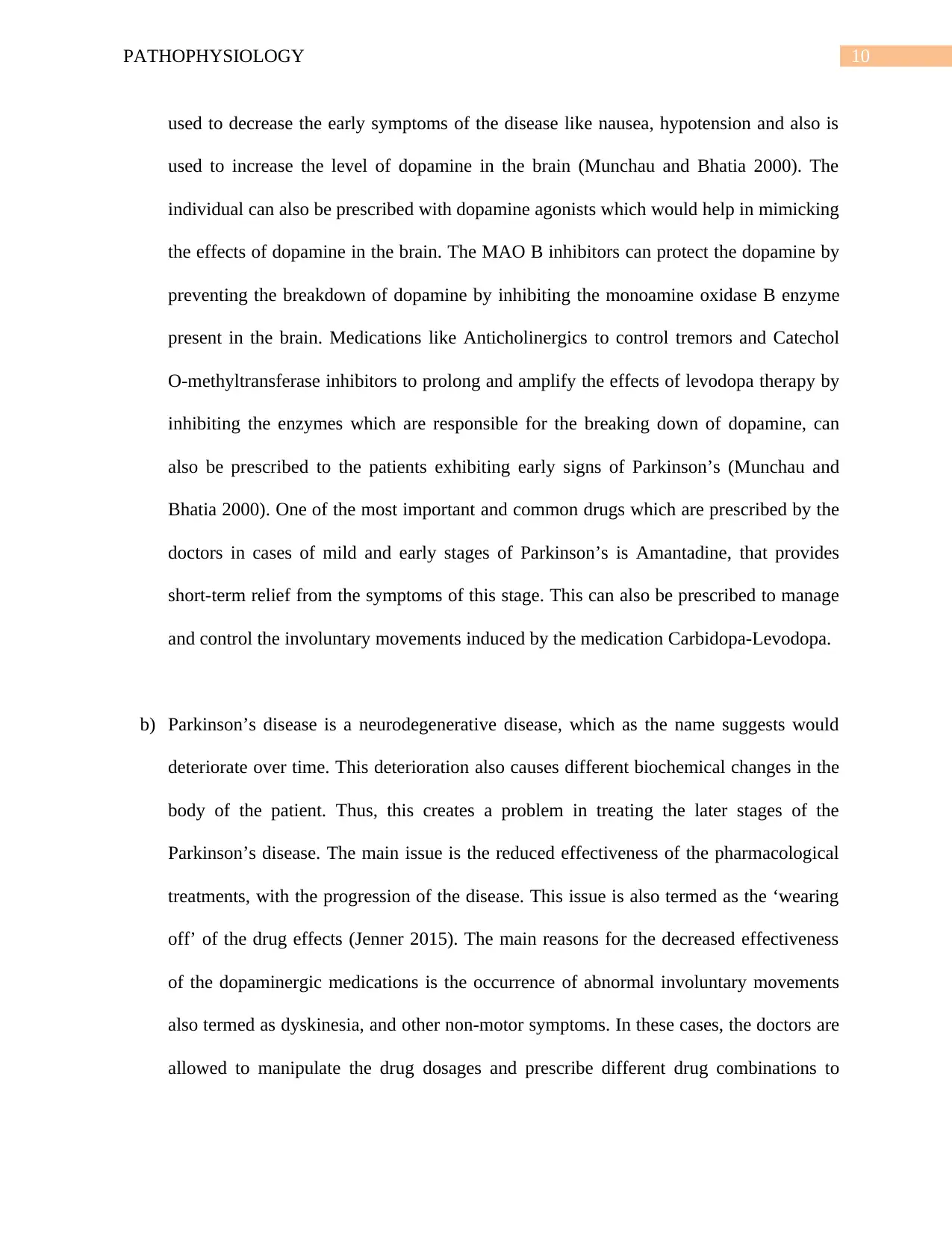
10PATHOPHYSIOLOGY
used to decrease the early symptoms of the disease like nausea, hypotension and also is
used to increase the level of dopamine in the brain (Munchau and Bhatia 2000). The
individual can also be prescribed with dopamine agonists which would help in mimicking
the effects of dopamine in the brain. The MAO B inhibitors can protect the dopamine by
preventing the breakdown of dopamine by inhibiting the monoamine oxidase B enzyme
present in the brain. Medications like Anticholinergics to control tremors and Catechol
O-methyltransferase inhibitors to prolong and amplify the effects of levodopa therapy by
inhibiting the enzymes which are responsible for the breaking down of dopamine, can
also be prescribed to the patients exhibiting early signs of Parkinson’s (Munchau and
Bhatia 2000). One of the most important and common drugs which are prescribed by the
doctors in cases of mild and early stages of Parkinson’s is Amantadine, that provides
short-term relief from the symptoms of this stage. This can also be prescribed to manage
and control the involuntary movements induced by the medication Carbidopa-Levodopa.
b) Parkinson’s disease is a neurodegenerative disease, which as the name suggests would
deteriorate over time. This deterioration also causes different biochemical changes in the
body of the patient. Thus, this creates a problem in treating the later stages of the
Parkinson’s disease. The main issue is the reduced effectiveness of the pharmacological
treatments, with the progression of the disease. This issue is also termed as the ‘wearing
off’ of the drug effects (Jenner 2015). The main reasons for the decreased effectiveness
of the dopaminergic medications is the occurrence of abnormal involuntary movements
also termed as dyskinesia, and other non-motor symptoms. In these cases, the doctors are
allowed to manipulate the drug dosages and prescribe different drug combinations to
used to decrease the early symptoms of the disease like nausea, hypotension and also is
used to increase the level of dopamine in the brain (Munchau and Bhatia 2000). The
individual can also be prescribed with dopamine agonists which would help in mimicking
the effects of dopamine in the brain. The MAO B inhibitors can protect the dopamine by
preventing the breakdown of dopamine by inhibiting the monoamine oxidase B enzyme
present in the brain. Medications like Anticholinergics to control tremors and Catechol
O-methyltransferase inhibitors to prolong and amplify the effects of levodopa therapy by
inhibiting the enzymes which are responsible for the breaking down of dopamine, can
also be prescribed to the patients exhibiting early signs of Parkinson’s (Munchau and
Bhatia 2000). One of the most important and common drugs which are prescribed by the
doctors in cases of mild and early stages of Parkinson’s is Amantadine, that provides
short-term relief from the symptoms of this stage. This can also be prescribed to manage
and control the involuntary movements induced by the medication Carbidopa-Levodopa.
b) Parkinson’s disease is a neurodegenerative disease, which as the name suggests would
deteriorate over time. This deterioration also causes different biochemical changes in the
body of the patient. Thus, this creates a problem in treating the later stages of the
Parkinson’s disease. The main issue is the reduced effectiveness of the pharmacological
treatments, with the progression of the disease. This issue is also termed as the ‘wearing
off’ of the drug effects (Jenner 2015). The main reasons for the decreased effectiveness
of the dopaminergic medications is the occurrence of abnormal involuntary movements
also termed as dyskinesia, and other non-motor symptoms. In these cases, the doctors are
allowed to manipulate the drug dosages and prescribe different drug combinations to
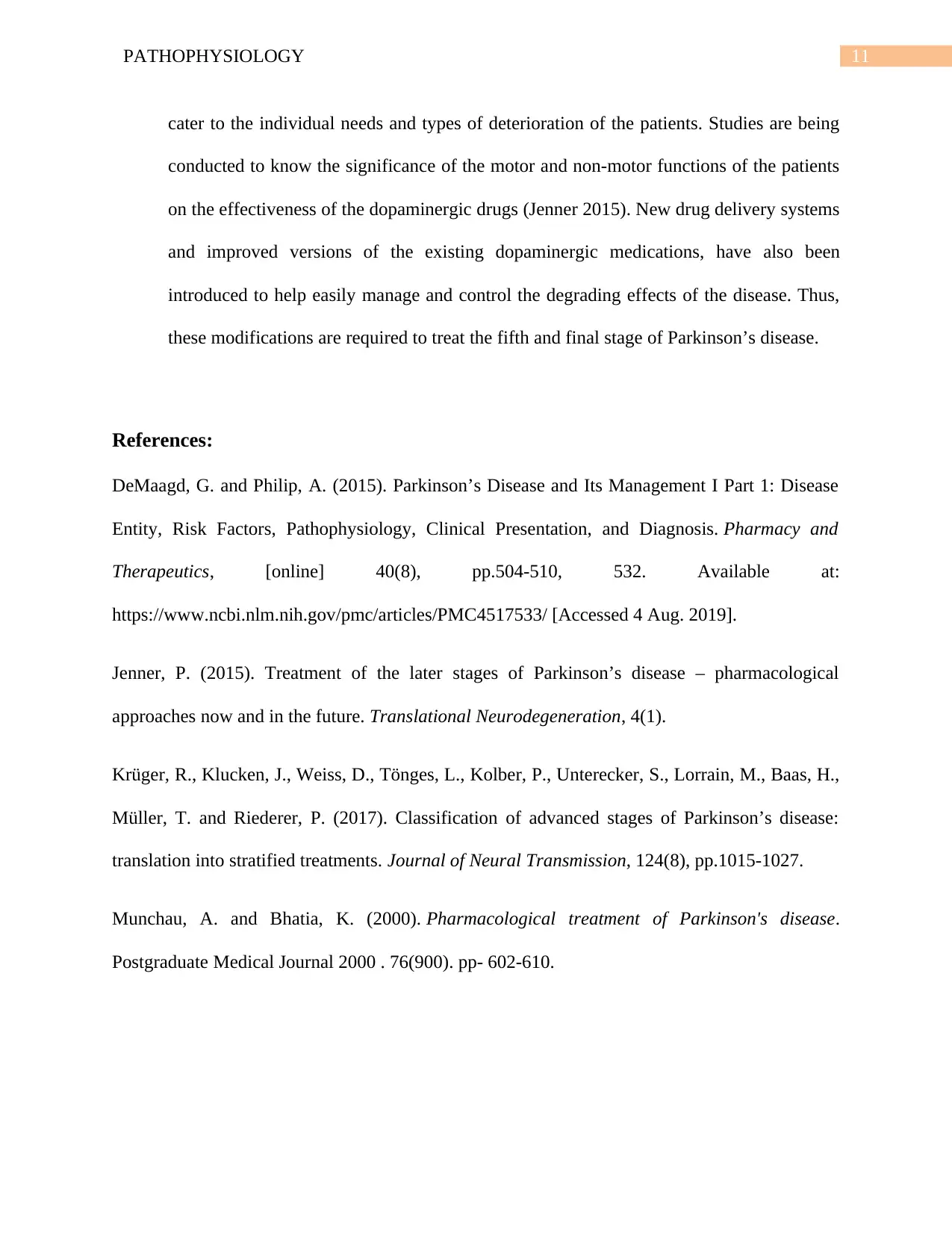
11PATHOPHYSIOLOGY
cater to the individual needs and types of deterioration of the patients. Studies are being
conducted to know the significance of the motor and non-motor functions of the patients
on the effectiveness of the dopaminergic drugs (Jenner 2015). New drug delivery systems
and improved versions of the existing dopaminergic medications, have also been
introduced to help easily manage and control the degrading effects of the disease. Thus,
these modifications are required to treat the fifth and final stage of Parkinson’s disease.
References:
DeMaagd, G. and Philip, A. (2015). Parkinson’s Disease and Its Management I Part 1: Disease
Entity, Risk Factors, Pathophysiology, Clinical Presentation, and Diagnosis. Pharmacy and
Therapeutics, [online] 40(8), pp.504-510, 532. Available at:
https://www.ncbi.nlm.nih.gov/pmc/articles/PMC4517533/ [Accessed 4 Aug. 2019].
Jenner, P. (2015). Treatment of the later stages of Parkinson’s disease – pharmacological
approaches now and in the future. Translational Neurodegeneration, 4(1).
Krüger, R., Klucken, J., Weiss, D., Tönges, L., Kolber, P., Unterecker, S., Lorrain, M., Baas, H.,
Müller, T. and Riederer, P. (2017). Classification of advanced stages of Parkinson’s disease:
translation into stratified treatments. Journal of Neural Transmission, 124(8), pp.1015-1027.
Munchau, A. and Bhatia, K. (2000). Pharmacological treatment of Parkinson's disease.
Postgraduate Medical Journal 2000 . 76(900). pp- 602-610.
cater to the individual needs and types of deterioration of the patients. Studies are being
conducted to know the significance of the motor and non-motor functions of the patients
on the effectiveness of the dopaminergic drugs (Jenner 2015). New drug delivery systems
and improved versions of the existing dopaminergic medications, have also been
introduced to help easily manage and control the degrading effects of the disease. Thus,
these modifications are required to treat the fifth and final stage of Parkinson’s disease.
References:
DeMaagd, G. and Philip, A. (2015). Parkinson’s Disease and Its Management I Part 1: Disease
Entity, Risk Factors, Pathophysiology, Clinical Presentation, and Diagnosis. Pharmacy and
Therapeutics, [online] 40(8), pp.504-510, 532. Available at:
https://www.ncbi.nlm.nih.gov/pmc/articles/PMC4517533/ [Accessed 4 Aug. 2019].
Jenner, P. (2015). Treatment of the later stages of Parkinson’s disease – pharmacological
approaches now and in the future. Translational Neurodegeneration, 4(1).
Krüger, R., Klucken, J., Weiss, D., Tönges, L., Kolber, P., Unterecker, S., Lorrain, M., Baas, H.,
Müller, T. and Riederer, P. (2017). Classification of advanced stages of Parkinson’s disease:
translation into stratified treatments. Journal of Neural Transmission, 124(8), pp.1015-1027.
Munchau, A. and Bhatia, K. (2000). Pharmacological treatment of Parkinson's disease.
Postgraduate Medical Journal 2000 . 76(900). pp- 602-610.
⊘ This is a preview!⊘
Do you want full access?
Subscribe today to unlock all pages.

Trusted by 1+ million students worldwide
1 out of 12
Related Documents
Your All-in-One AI-Powered Toolkit for Academic Success.
+13062052269
info@desklib.com
Available 24*7 on WhatsApp / Email
![[object Object]](/_next/static/media/star-bottom.7253800d.svg)
Unlock your academic potential
Copyright © 2020–2026 A2Z Services. All Rights Reserved. Developed and managed by ZUCOL.





